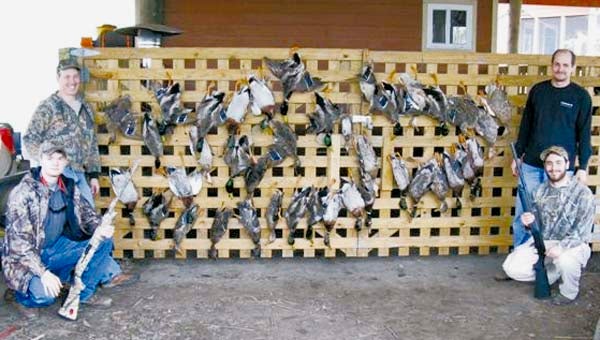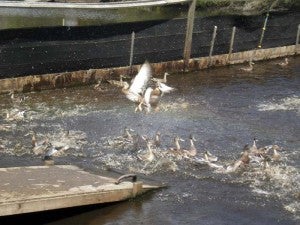Ducks Unlimited member doing part
Published 8:57 am Friday, September 24, 2010

Ed Sedlak, Ron Schwartz, Matt Sedlak and Jordan Myers, all of the Greensboro, N.C., after taking their limit while hunting on a property in Hyde County, N.C. -- SUBMITTED
BOB’S FIELD NOTES
Welcome back, hunters and anglers.
This week I’d like to talk about Ducks Unlimited, what it is and what its members do for the hunting community.
Most have no idea what is invested in maintaining quality waterfowl hunting. I’d like to tell you about a Ducks Unlimited member and what he does with his own money to preserve and share his love of this sport.
Mike Tierney of Manteo, N.C., owns 800 acres in Hyde County, N.C. The property is dedicated to hunting, including duck hunting.
Last weekend, he released 450 mallards into the wild. These ducklings were delivered in May to his holding pen. Mr. Mike drove 110-miles roundtrip every three days to feed them until their release.
Just imagine the amount of corn required to feed 450 ducks for four months. Add on the cost of gasoline, water pumps and a pen large enough to contain the ducks, and the time required to care for them.
Mike does this year after year, out of his own pocket, and the ducks are free to go. Most will hang around, and a certain number will become dinner fare, but Mike is careful to allow a minimum number to remain and repopulate. His efforts are not without reward. Prior to releasing this year’s ducks, I counted 200 or more within sight, yet outside the pen.
Ducks Unlimited members like Mr. Mike are doing this kind of work throughout the United States and Canada. His efforts are not included in the $3.16 billion contributed directly to Ducks Unlimited.
It is work that goes on behind the scenes. It is not easy, it is not cheap, yet it is making a mark on the future for all of us who love the outdoors.
There are more than 604,000 Ducks Unlimited members in the United States. Most cannot invest as Mike does, but we can contribute to this organization so leadership can invest on our behalf. Ducks Unlimited has conserved almost 60 million acres of wetlands since its beginning in 1937.
Contact Ducks Unlimited headquarters at (901) 758–3825, or by visiting www.ducks.org.
Mr. Mike offers full package hunting opportunities on his property. This includes first-class lodging, meals and a field guide. His record for ducks is perfect — everyone leaves with their limits. Mike’s hunters come back year after year and leave with memories that are hard to match.
Gentlemen, if you want to take your sons or grandsons on a hunt they will remember, get in touch with someone like Mr. Mike. This is also a great way to “get out of the office” and tighten up your team players. How about that customer who has a love for hunting?
Mr. Mike can be reached at (252) 423-0588. He offers duck, bear, tundra swan and goose hunts.
I sure would like to hear from the readers about similar hunting opportunities within the Western Tidewater area. I spoke briefly with Thomas Miller, business development manager for Franklin Southampton Economic Development, and we agree the hunting opportunities for this area are a significant source of revenue that need to be explored.
I was a little disappointed I didn’t receive any pictures from readers this past week. I especially love seeing the young hunters; their excitement can’t be hidden from their face. My e-mail address is greyhound77@cox.net.
Don’t forget, safety always comes first. Be kind to our environment and respectful of others’ property while in the field and have a great time while you’re at it.
Most members of Ducks Unlimited are also hunters. Some people call them redneck killers. To those people, I challenge you to educate yourself about this organization and the positive effects it is having on the environment and wildlife.
Ducks Unlimited and the National Rifle Association are probably the two largest organizations taking heat from these uneducated individuals, but there are many more organizations involved in hunting and conservation. I would not be afraid to wager that most hunters and anglers do more for wildlife and environmental conservation than most people who oppose hunting.






